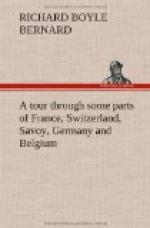I next reached Sens, a large and ancient city, but thinly inhabited, and with little marks of activity, although situated in a country abounding with all the conveniences of life, and possessing a situation on the rivers Vanne and Yonne, which seems to shame its inhabitants for their neglect of the commercial advantages they afford.
The Cathedral is a venerable structure, and contains the tomb of the Dauphin, father of the present King, who died in 1765.—About sixteen English miles distant is Joigny, beautifully situated on the Yonne, and surrounded on all skies by vineyards; we now were approaching one of the parts of France most famous for its wines.
The road, which is in excellent repair, follows the windings of the river to Auxerre, which, although much less than Sens, has a more lively appearance, and the inhabitants seem to make more use of the facilities which the river affords of communicating with Paris and the rest of the country. The churches here are handsome, the tower of one of them is said to have been built by the English.
The Vineyards in this neighbourhood are numerous, and the wine is much esteemed.
I waited here for the arrival of the Paris Diligence, in which I proposed to proceed to Dijon, wishing not to leave France without having made trial of one of their public carriages.
The appearance of that which I saw at Calais was much against it; the one I met with here proved a very tedious conveyance, not going in general above three or four English miles an hour; which, however is as much as could be expected from a carriage which is scarcely less laden than many of our waggons. It was drawn by five horses, all managed by one postilion, mounted on one of the wheel horses, and furnished with a vast and unwieldy pair of boots, cased with iron, and a long whip, which he is perpetually employed in cracking. Another important personage is Monsieur le Conducteur, who has the care of the luggage, &c. The French in general adhere to old customs, as well as the postilions to their antiquated boots; their hour of dinner in general being from eleven to twelve o’clock, and seldom so late as one. This in England would be considered only as a Dejeuner a la Fourchette. The hour of supper is from seven to nine, according as the length of the stages may determine.
If the hour of a French dinner is singular to an Englishman, the order in which it is served up is not less so. The soup (that great essential to a Frenchman) is always followed by bouilli, which having contributed to make the soup, is itself very tasteless.—Fricassees and poultry succeed; then follow fish and vegetables, and last of all comes the roti, which, as I before had occasion to observe, is so much done as not to be very palatable. The pastry and desert conclude their dinners, which certainly deserve the praise of being both cheap and abundant. The fruit is astonishingly cheap; I. have seen excellent peaches sell for a sous apiece. A traveller is not, however, in general disposed to criticise these singularities, either in the hour or order of the repast with too much severity, as the remark attributed to Alexander the Great, has probably been made by many of less celebrity, “that night travelling serves to give a better appetite than all the skill of confectioners.”




